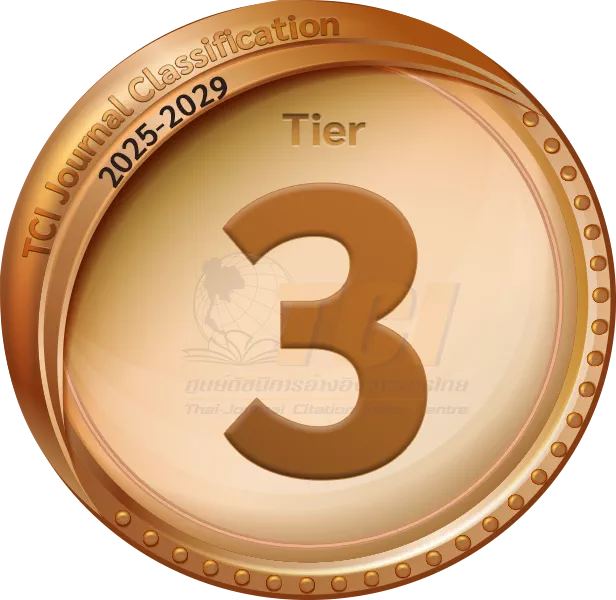
เกี่ยวกับวารสาร (About the Journal)
วารสารการเกษตรราชภัฏ (Rajabhat Agriculture Journal) เป็นวารสารทางวิชาการของคณะเกษตรศาสตร์ มหาวิทยาลัยราชภัฏอุบลราชธานี ซึ่งมีวัตถุประสงค์เพื่อเผยแพร่บทความวิจัย และบทความวิชาการ ทางด้านเกษตรศาสตร์ เช่น พืชศาสตร์ ปฐพีศาสตร์ สัตวศาสตร์ วิทยาศาสตร์การประมง อารักขาพืช เทคโนโลยีหลังเก็บเกี่ยว วิทยาศาสตร์และเทคโนโลยีการอาหาร อาหารและโภชนาการ เศรษฐศาสตร์เกษตรและธุรกิจเกษตร นวัตกรรมการเกษตร การส่งเสริมและพัฒนาการเกษตร และสาขาอื่นๆ ที่เกี่ยวข้องกับการเกษตร เป็นวารสารราย 6 เดือน กำหนดเผยแพร่ ปีละ 2 ฉบับ ในรูปแบบการเผยแพร่ตั้งแต่ ปี พ.ศ. 2544 (ISSN 1686-5103: พิมพ์) และในรูปแบบอิเลคทรอนิกส์ (Online) ที่เว็ปไซต์ https://li04.tci-thaijo.org/index.php/kjna
ขอบเขต (Scope)
วารสารการเกษตรราชภัฏ (Rajabhat Agriculture Journal) พิจารณาเผยแพร่บทความวิจัย (Research Articles) และบทความวิชาการ (Academic Articles) ทางด้านเกษตรศาสตร์ อาหารและโภชนาการ นวัตกรรมการเกษตร การส่งเสริมและพัฒนาการเกษตร และสาขาอื่นๆ ที่เกี่ยวข้องกับการเกษตร โดยมีผู้ประเมินบทความที่เชี่ยวชาญในสาขาที่เกี่ยวข้องกับบทความนั้น ๆ อย่างน้อย 3 ท่าน
ประเภทของบทความ (Types of articles)
- บทความวิจัย (Research article)
- บทความวิชาการ (Academic article)
การพิจารณาและคัดเลือกบทความ
บทความแต่ละบทความจะได้รับพิจารณาจากคณะกรรมการกลั่นกรองบทความวารสาร (Peer Review) จากผู้ทรงคุณวุฒิ 3 ท่าน ต่อ 1 บทความ โดยบทความผู้นิพนธ์ภายนอกได้รับการพิจารณาจากผู้ทรงคุณวุฒิภายในและผู้ทรงคุณวุฒิภายนอก ส่วนบทความผู้นิพนธ์ภายในได้รับการพิจารณาจากผู้ทรงคุณวุฒิภายนอกหน่วยงานที่จัดทำวารสาร มีความเชี่ยวชาญตรงตามสาขาวิชาที่เกี่ยวข้อง และได้รับความเห็นชอบจากกองบรรณาธิการก่อนตีพิมพ์ ทั้งนี้จะมีรูปแบบที่ผู้พิจารณาบทความไม่ทราบชื่อผู้นิพนธ์บทความและผู้นิพนธ์บทความไม่ทราบชื่อผู้พิจารณาบทความเช่นเดียวกัน (Double-Blind Peer Review)
กระบวนการพิจารณากลั่นกรองบทความ
วารสารการเกษตรราชภัฏ ได้กำหนดเงื่อนไขการพิจารณา และคัดเลือกบทความ ดังนี้
1. กองบรรณาธิการตรวจสอบหัวข้อและเนื้อหาของบทความถึงความเหมาะสมและสอดคล้องกับวัตถุประสงค์ของวารสาร การยอมรับบทความเป็นสิทธิของบรรณาธิการ และบรรณาธิการของสงวนสิทธิ์ในการตรวจแก้บทความ และอาจส่งกลับคืนให้ผู้เขียนแก้ไข เพิ่มเติม หรือพิมพ์ใหม่
2. กองบรรณาธิการจะแจ้งให้ผู้ส่งบทความทราบเมื่อกองบรรณาธิการได้รับบทความเรียบร้อยสมบูรณ์ และขอสงวนสิทธิ์การส่งบทความให้ผู้ทรงคุณวุฒิ (Reviewer) โดยได้รับความเห็นชอบจากกองบรรณาธิการก่อนตีพิมพ์ ซึ่งบทความที่ส่งมาเพื่อพิจารณาเผยแพร่ในวารสาร ต้องไม่เคยเผยแพร่ในรูปแบบใดมาก่อนและจะต้องไม่นำส่งไปยังวารสารอื่นจนกว่าจะได้รับทราบผลหากไม่ผ่านการพิจารณาหรืออนุมัติให้ยุติการพิจารณาจากบรรณาธิการ
3. ในกรณีที่กองบรรณาธิการพิจารณาเห็นควรให้ดำเนินการส่งบทความเพื่อพิจารณากลั่นกรองต่อไป บรรณาธิการจะส่งให้ผู้ทรงคุณวุฒิในสาขาที่เกี่ยวข้องจำนวน 3 ท่าน (ในกรณีที่ผู้เขียนต้องการผู้ทรงคุณวุฒิเพื่อพิจารณากลั่นกรอง อย่างน้อย 3 ท่าน โปรดระบุในใบนำส่งบทความ) เพื่อตรวจสอบคุณภาพของบทความว่าอยู่ในระดับที่เหมาะสมที่จะลงตีพิมพ์หรือไม่
4. การพิจารณาบทความจะมีรูปแบบที่ผู้พิจารณาบทความไม่ทราบชื่อหรือข้อมูลของผู้เขียนบทความ และผู้เขียนบทความไม่ทราบชื่อผู้พิจารณาบทความ (Double-blind Peer Review) ทั้งภายในและภายนอกมหาวิทยาลัย
5. เมื่อผู้ทรงคุณวุฒิได้พิจารณากลั่นกรองบทความแล้ว กองบรรณาธิการจะตัดสินใจโดยอิงตามข้อเสนอแนะของผู้ทรงคุณวุฒิว่าบทความนั้น ๆ ควรจะตีพิมพ์ในวารสารการเกษตรราชภัฏหรือไม่ หรือควรที่จะส่งให้กับผู้เขียนบทความนำกลับไปแก้ไขก่อนพิจารณาอีกครั้งหรือปฏิเสธการลงตีพิมพ์
6. กรณีที่ผลการพิจารณาให้ข้อเสนอแนะของผู้ทรงคุณวุฒิมีความเห็นขัดแย้งกัน กองบรรณาธิการขอสงวนสิทธิในการ ปฏิเสธการรับตีพิมพ์บทความนั้น ๆ ซึ่งผู้เขียนสามารถนำข้อเสนอแนะที่ได้จากผู้ทรงคุณวุฒิไปพัฒนาบทความทาง วิชาการเพื่อนำเสนอต่อวารสารอื่น ๆ ได้
7. กรณีที่บทความมีความโดดเด่น หรือมีความสอดคล้องกับประเด็นทางวิชาการ หรือสอดคล้องกับสถานการณ์ปัจจุบัน กองบรรณาธิการขอสงวนสิทธิ์ในการพิจารณาเพื่อเสนอตีพิมพ์และเผยแพร่เป็นกรณีพิเศษ
ภาษาที่รับเผยแพร่ (Language)
ภาษาไทย
กำหนดการตีพิมพ์เผยแพร่
กำหนดตีพิมพ์เผยแพร่เป็นประจำทุก 6 เดือน ปีละ 2 ฉบับ โดยเผยแพร่จำนวนบทความวิจัย/บทความวิชาการ ฉบับละ 8 - 12 เรื่อง คือ
ฉบับที่ 1 มกราคม - มิถุนายน
ฉบับที่ 2 กรกฎาคม – ธันวาคม
ค่าธรรมเนียมการตีพิมพ์บทความ (Article Processing Charges, APC)
- ไม่มีการเรียกเก็บค่าธรรมเนียมการตีพิมพ์
การส่งบทความเข้าระบบเพื่อได้รับการตีพิมพ์
การส่งในระบบ (Online Submission) สามารถส่งเข้าระบบออนไลน์เว็บไซต์ของวารสารการเกษตรราชภัฏเป็นไฟล์ word เท่านั้นที่ https://li04.tci-thaijo.org/index.php/kjna
หน่วยงานสนับสนุน (Sources of Support)
คณะเกษตรศาสตร์ มหาวิทยาลัยราชภัฏอุบลราชธานี
อัพเดตข้อมูลล่าสุดวันที่ 28 มกราคม 2568
